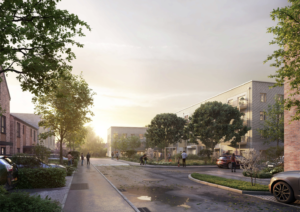Following slow progress in summer, new research shows house prices increased by 0.5% in September.
Figures from Nationwide Building Society show the average price of a UK home rose by 0.5% last month. The increase follows a 0.1& dip in August and brigs annual price growth to 2.2%.
Robert Gardner, chief economist at Nationwide, said the latest figures point to ‘broad stability’ across the market.
‘The number of mortgages approved for house purchase have been hovering at about 65,000 cases per month, close to the pre-pandemic average,’ he said. ‘Despite ongoing uncertainties in the global economy, underlying conditions for potential homebuyers in the UK remain supportive.
‘Unemployment is low, earnings are rising at a healthy pace, household balance sheets are strong and borrowing costs are likely to moderate a little further if Bank Rate is lowered in the coming quarters as we, and most other analysts, expect.’
Last month the Bank of England decided to hold interest rates at 4%, pausing a string of cuts that began last summer. However, inflation hasn’t followed such a positive trend. Separate research from the Office for National Statistics (ONS) revealed inflation remained at 3.8% in August, with the cost of food putting particular strain on household budgets.
Commenting on the news of house price growth, Tom Brown, managing director of real estate at Ingenious, said the research ‘underscores the resilience and appeal of the UK property sector.’
Despite elevated inflation and stubborn borrowing costs, we welcomed the BoE’s recent rate cut as a hopeful first step in a much-needed easing cycle,’ Tom continued. ‘There’s clearly a significant and notable shortage of housing inventory across various price brackets and locations.’
‘However, it’s crucial to recognise that the situation isn’t consistent nationwide or across different property pricing brackets. It’s helpful to delve into subsectors and regional dynamics when assessing opportunities, as a broad market view can be misleading,’ he added
‘In the real estate sector, we’re seeing significant investment capital for assets for long-term rental. On account of their scale and buying power, these typically institutional investors face fewer disruptions than owner occupiers or small-scale buy-to-let investors.’
Next month chancellor Rachel Reeves is set to deliver the government’s autumn budget, which could affect house buyers’ confidence. Over the summer speculation began over whether taxes will continue to rise after the Treasury considered a new tax on the sale of homes worth more than £500,000. The plan came as part of an idea to overhaul council tax and stamp duty.
Photo by Trayan via UnSplash
In related news:
Starmer announces regeneration plan to counter Reform threat



















Leave a Reply